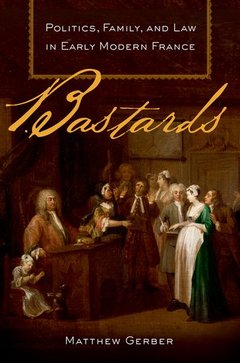Bastards Politics, Family, and Law in Early Modern France
Langue : Anglais
Auteur : Gerber Matthew

Children born out of wedlock were commonly stigmatized as "bastards" in early modern France. Deprived of inheritance, they were said to have neither kin nor kind, neither family nor nation. But why was this the case? Gentler alternatives to "bastard" existed in early modern French discourse, and many natural parents voluntarily recognized and cared for their extramarital offspring. Drawing upon a wide array of archival and published sources, Matthew Gerber has reconstructed numerous disputes over the rights and disabilities of children born out of wedlock in order to illuminate the changing legal condition and practical treatment of extramarital offspring over a period of two and half centuries. His book reveals that the exclusion of extramarital offspring from the family was perpetually contested in early modern France. Legal debate over illegitimacy carried political implications for France's dynastic monarchy. When Louis XIV, the Sun King, created a political firestorm by declaring his own extramarital offspring to be capable of inheriting the French crown, political theorists drew upon precedents of private law to argue for or against the exclusion of children born out of wedlock from the throne. Conversely, lawyers and litigants frequently invoked political interest in the course of private lawsuits involving extramarital offspring. In tracing the evolution of early modern debates over illegitimacy, Bastards offers a political history of the family from the oblique perspective of those who were theoretically excluded from it. With a cast of characters ranging from royal bastards to foundlings, Bastards offers a broad exploration of the relationship between social and political change in the early modern era. It offers new insight into the changing nature of early modern French law, revealing its evolving contribution to the historical construction of both the family and the state.
Preface. A Note on the Text. Introduction: Illegitimacy and the Political History of the Family. Part I: Stigmatizing the Bastard. Chapter One: Bastardy in Sixteenth-Century French Legal Doctrine and Practice. Chapter Two: Jurisprudential Reform of Illegitimacy in Seventeenth-Century France. Chapter Three: Royal Bastardy aamp, Dynastic Crisis. Part II: Destigmatizing the Natural Child. Chapter Four: State Expansion, Social Practice, and the Quandaries of Legal Unification. Chapter Five: Redefining Social Interest: The Eighteenth-Century Foundling Crisis. Chapter Six: Illegitimacy and Legal Change in the French Enlightenment. Conclusion. Appendix. Notes. Bibliography. Index.
Assistant Professor of History, University of Colorado, Boulder
Date de parution : 02-2012
Ouvrage de 288 p.
23.9x16.3 cm
Thèmes de Bastards :
© 2024 LAVOISIER S.A.S.



